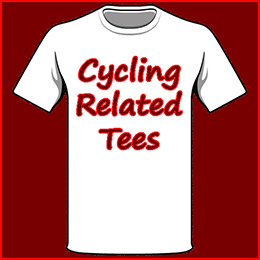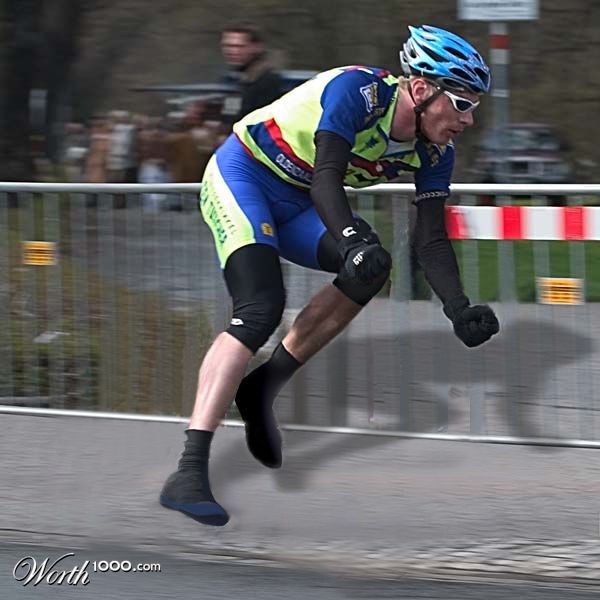The Weight Weenie
 Wed, June 6, 2012
Wed, June 6, 2012 A Weight Weenie is a person who is obsessive about the weight of their bicycle; it is a trait, to this day I do not fully understand.
Shaving a few grams of weight from your bike will also slim down your bank account by copious amounts of cash, as you replace components with lighter, more expensive, and sometimes less reliable ones.
The question I always want to ask is, “Do you want to ride it, or weigh it?” Of course, a road bike or racing bicycle needs to be lightweight, but to what limit. What is the point of removing a few grams from your bike if your body is 10, 20 or more pounds overweight?
Even the serious racing cyclist who is a super fit athlete will want to consider whether, for example, is it worth it to buy a super light component and have it break and cost him the race. In bicycle racing it is always the rider not his equipment that wins races.
If you are trying to fly, become airborne, weight is a big factor. However, rolling on a flat surface weight has little effect, and you could argue that added weight would give you momentum.
Consider this scenario. A standard size water bottle filled with water weighs a pound and a half. If you are riding with a friend and you hand him your water bottle, you have instantly lost 1 ½ lbs. and he has gained the same amount.
If weight were such a large factor, you would expect that you would suddenly shoot forward and your friend would drop back. The fact is neither of you feel the slightest difference, even if you are climbing a hill.
It is on the hills, the Weight Weenie will argue that weight, or lack of it is an advantage. I sometimes wonder if this is entirely true. I used to build a criterium frame in Columbus SP tubing that was heavier than my road frame built in SL.
Owners of this particular model always remark how well the bike climbs. The reason is the stiffness of the frame, transfers the rider’s energy to the rear wheel more efficiently. Whether this criterium bike is actually faster or just feels faster is something that would be difficult to prove.
I will say this, if I am riding up hill on my 20 plus pound steel road bike with another rider of equal fitness level on a 14 lb. carbon fiber bike. I claim we would both arrive at the top at the same time.
Weight Weenieism is not a disease, there is no 12 step cure; it is a more like a religious or political belief. It is relatively harmless, although it can cause financial hardship, leading to marital stress.
And remember this: Blingy equipment that weighs less than an anorexic butterfly is no substitute for miles in your legs
 Dave Moulton | Comments Off |
Dave Moulton | Comments Off | 






















Reader Comments (31)
Am reminded of this picture of Albert Einstein, um, not on his bike:
here
I believe it's all about the perception of "value". The cost of a bike is inversely proportional to its weight. Having a lighter bike than the next guy is one-upmanship. You see a similar thing (but opposite) in owning cars. People want bigger, heavier cars, ultimately luxury SUVs, to show they're more successful than the next guy.
Interesting thought experiment. Kind of makes me rethink this whole deal about "weight."
And, this:
Now, I'm really paying attention. Gonna have to think this through a lot more.
Interesting. And, the reason I keep dropping by. Thanks, Dave. Food for thought.
I completely agree. Personally I apply the old hackneyed expression 'time is money' when contemplating an upgrade. As in, how long would I have to work to make the money to purchase this, and if I spent that time on the road instead, would I be faster? Most of us would agree that both time on the bike and money spent on equipment can strain a relationship, so you have to pick and choose! You also have to think about how long that fancy equipment is going to last, because replacing stuff costs money too... that is why I still ride and race on steel bikes with normal parts. I know that carbon fiber stuff is lighter and maybe will make you ever so slightly faster- but time is money!
I'd also agree the weight thing is overblown. Sure, a 20 pound bike will feel better then a 40 pounder, but a few pounds either way on a fairly light bike doesn't matter much.
Light bikes do feel faster - snappier for sure. But they're not really any faster overall, it's still up to the rider. Riders are fast (or not), not bikes.
I've been doing the same commute route for 10 years now, which I've ridden hundreds of times. Mostly flat, a few short hills, with one 2 mile actual climb (on the way home). 17 miles total. Some days I ride hard, others I cruise. I time my commute a lot, not to the second, but to the minute. After a few hundred trips, a pretty good test, no?
I commute with two different bikes. Light carbon rig at about 17 pounds for nice days. Older steel cyclocross bike with fenders for rainy days. Probably 20+ pounds. Guess which one is "faster"?...
After timing numerous commutes on both bikes, it makes no difference - even though the carbon bike "feels faster". And my personal speed record for each direction was on the older steel bike, back a few years ago when I was really fit and riding well.
Sorta punches a hole in the bicycle marketing schtick, no?
a few ounces or even pounds in a total weight of bike and rider of 160+ lbs is not going to make any difference at all on the flats and an insignificant difference (maybe 0.5 %) on the hills. and it may add speed on the downhills. the only thing that is really important is the rotational inertia of the wheels and that is only important during acceleration. physics is physics.
It's about time. If I have 300 watts, then moving my weight + bike up a hill will take XX minutes. If I lose 2kg, it will take Y minutes less. Is Y the difference between winning and losing? That's a personal choice but sometimes it is.
After a few quick calculations, 2kg difference over a 15km 8% climb will be about a 1.5 minutes.
What is far more impacting is tyre choice. Improving rolling resistance can generally save you far more watts than overall weight can.
On those occasions when someone asks me how much my bike weighs (29 lb, it has a steel 69cm frame, so it's not that strange a question) I always point out that I weigh 200 lb. If I were to spend umtpy-thousand dollars to get, say, a 19 lb bike (a decrease from 29 to 19 lb sounds like a lot), the combination would only drop from 229 lb to 219 lb, which isn't nearly as impressive. I suppose if it were important that I get to the top of a hill a few seconds before someone else, it might be worth it. But if it were important that I get to the top of a hill a few seconds before someone else, I'd have given up on cycling long ago.
The photo reminds me more of Monty Python horses movie! But I have always ridden steel bikes. My 2005 Mercian Vincitore weighs 23lbs with full Camag kit.bag mudguards bottle etc. I did find a real good deal on a full carbon Concorde Xbade, Campag record,.Easton wheels weighs 15 1/2lbs 17lbs with bag and full bottle. I have to admit when I FIRST got it I felf like I was flying, riding it. NOW the newness has worn off, it is easier to ride up hills, BUT do I go any faster, I doubt it! maybe on a long 100 mile it would be eaiser and save me some energy. IF I had NOT got the deal I did, I would NOT have invested in carbon. To day is my 79th B/D and I will be going on a 79 mile ride on MY BRIT MERCIAN to celebrate well maybe not quite 79 miles but I will give it a go!.
i wish someone with credibility in the biking world would explain all this to 'the lovely bicycle" blog.
I know about that blog. She does ride Mercians, ladies bikes. But that blog is not my cup of TEA.
not only. she has got into race bikes, paceline riding clubs and perhaps some racing and seems convinced that lightness = bike speed.
I read Bicycling Quarterly, a publication written by an experienced cyclist and author skilled in the scientific method, he has data to demonstrate that stiffer bikes are not necessarily the best climbing bikes. He does though demonstrate that weight does not matter as much as rolling resistance of tires.
Jay
You're right, Jay. Jan Heine, editor of Bicycle Quarterly, has a lot data on how a frame made from lighter tubing will flex and "resonate" with pedal strokes, making the bike faster. He calls it "planing". It's like when a boat comes up on plane at a certain speed, skimming on top of the water instead of plowing through it, requiring less power. It's not the weight of a light bike that makes it faster, it's the flexibility.
I don't know if he has demonstrated how frame flex can actually provide a forward driving force to the wheels.
gabriel, if you read the Bicycle Quarterly articles, you may understand. The frame flexes, but springs back, absorbing practically no energy. When the pedal input is in synch with the spring constant of the frame you get the most efficient propulsion with the least amount of effort. It's been found that frames made from light, traditional diameter tubing work best. Stiff, oversize tubing frames feel "dead".
I have read it and I have also read differing opinions. And I am a mechanical engineer with a lot of experience in stress and vibration analysis with enough experience to know that the term "in synch with the spring constant" is a meaningless concept. I am not saying that flex frames are not more efficient but I am not convinced his analysis as to why is on the money.
gabriel, I too am a mechanical engineer, so we don't need to explain much to each other. I was trying to explain the concept for non-technical folks. Since Jan's "planing" theory has proven itself in practice, I won't debunk it, even if I may not be able to prove it mathematically.
Suffice it to say, lightweight frames do "feel" better riding than gaspipe ones. If the ride feels better, you'll ride faster.
Perhaps the rider will ride faster for SOME reason, but i cannot be convinced its because the frame is storing energy and feeding it back into the powering of the bike during the flat spots in pedaling.This kind of theorizing is unproductive as far as I am concerned as it is not supported by a logical analysis and misleads the layman. So while a lightweight and flexible bike may be faster, it doesnt follow that this proves the planing theory as far as I can see. And i am not convinced that a light bike is faster if we're only talking a pound or two. I agree that lighter wheel/tires will accelerate faster. But a pound or two on the frame in a total package of 160+ lbs will make no difference on the flats and only a small amount on the hills.
When will the people that do, not teach, take back the business of producing?
Alexi Grewal rode a flexi SL-tubed Pinarello, after refusing to ride the SP-tubed (stiffer) Ben Serotta built “Murry” bikes to Gold in 1984. And he was an awesome climber on such a flexible frame, actually preferring it to a “stiffer” one. And he won in a sprint…
Oh, what about Lance removing the left-hand shifter on mountain stages of the Tour to Save Weight? Crock of Shit!
There isn’t one study that exists that can (honestly) support lower bike weight having anything to do with going faster. Cycling is a business, as are all sports. And Business expects an endless stream of profits (gotta feed those pesky investors). And you’re damn right they’ll cite (even fund) “studies” to support their specious spiel.
When a performance study includes the human element, you can throw any and all results out with the contaminated water. No lab can duplicate real life (no day can be replicated so life isn’t a constant), and no formula exists that explains how humans on bikes climb mountains. Never will.
That is why we will always be amazed with the bicycle.
good post Steve!
Having recently bought a mass-production steel frame bike that I love (Jamis Quest -- pretty far from custom-ville) I'll jump on.
I rode a 2007 Cannondale CAAD 8 for four years because I felt it would make me faster in the hills, where I struggle. Aside from the uncomfortable race geometry, I also found the ride quality very tiring. Like riding on a razor blade.
I test rode a bunch of steel frames before the Quest, they all felt heavy. Test-rode the Quest, and I flew. It "wanted" to ride fast. It's maybe three lbs heavier and MUCH more upright than the CAAD 8. But in one month, I've already had three or so rides on which I felt WAY more fit. (Read more about the Quest by following the link to my blog, Velophoria).
My mind says, "There's just no way it isn't harder to lug three extra lbs. up a long hlll." My body and spirit say, "Shut up and ride!"
@gabriel - If you're idea of a weight weenie is the Lovely Bicycle blog, I don't think you're reading her blog very carefully. There are differences between a full on touring bike, loop frame city transport bike, and a bike suitable for fast club rides. I think she's actually an excellent advocate for rational bike design/selection.
Max. I feel I am every bit as able to comprehend the written word as you are. If you have a different opinion of ALL the writings on the subject in that blog, so be it. I have mine.
The idea of the springy frame helping you along is attractive. I recently put a Cinelli SLX frame back into service (happily it has a full set of 'tiddly bits') and it feels more responsive than my Cervélo RS. Possibly the lower bottom bracket -- something Dave commented on recently -- has something to do with it. Faster? Unlikely, if only because of the trad 32-spoke wheels. Modern wheels with carbon-fiber rims and half the number of spokes really do go faster, but comfort is a different matter.
I think we're all agreed that numerous factors affect the quality of a bike's ride, which contributes to how fast it feels.
First of all has to be fit. A ride on a comfortable fitted bike - whether it's fitted for flat-back speeding or heads-up touring, feels lovely and gets the best out of the engine.
Next has to be the non-fitment geometry - chainstay length, steering geometry, BB height. My (cheap and nasty) road bike feels much more agile with its 405mm chainstays than my tourer with 460mm stays. It wants to go faster. Whether it's actually faster point-to-point is debatable.
Another factor that I'd like to throw in to the mix may affect me more than others: Noise, Vibration and Harshness (NVH). NVH is an automotive engineering acronym, and it's no coincidence at all that I'm an automotive NVH engineer. The "H" is somewhat arbitrary (and not quantifiable), and is often dropped from the acronym (N&V is becoming a more frequent term).
I respond quite differently to bikes depending on how they sound to ride. Creaks and rattles aside (no such noise should be tolerated on a bike!), the differences in sizzle and zing of different tyres on different tarmac surfaces really changes the mood of the ride. My 1.5" tyres make a hell of a noise on my tourer, crackling and popping their way over rough chipseal, and to me they sound faster than the dull thudding sound my 1.1" tyres make on the same bike.
People go on about the "inherent damping" of a steel frame or the "deadness" of carbon - in my opinion, differences in "feel" between frame material are dwarfed by the differences between tyres - and I suspect they're commenting as much on the sound of the bike as anything else. With a bit of tactile vibration on the side.
After all that... for sure, weight has a non-zero effect on acceleration and uphill speed. It's physics. But I agree that it's not the end-all of making a bike fast.
There's also the psychological effect of how a light bike feels. Standing up and sprinting on a <10kg road bike feels quite different to standing up and cranking a loaded tourer. Throwing around a bike with 2kg of water bottles attached feels different to throwing around an unloaded bike while carrying the same 2kg of water on your back - part of the reason I strip my mountain bike bare, and carry everything on my body. Weight distribution doesn't make a scrap of difference to speed, but it affects how the bike feels.
Stiffness? Aside from having a critical role in NVH, I'm not sure there's much to be said about stiffness on a bike, especially relating to speed, efficiency and power.
After fitness, bike speed is 99% psychology. And for those of us who aren't racing for a living, the remaining 1% probably doesn't matter all that much. If it feels good, ride it. If making it lighter feels good, make it lighter and ride it.
very well said timpaton
The 2005 National hill climb championship was won by 0.5 seconds, which is about 0.5Kg of weight.
I just missed out on a medal by 1 second in the 2011 UK National hill climb championship.
In this kind of race, reducing weight on your bike is essential - even if it does hurt my bank balance! But for a time trial on flattish roads, weight is overrated. - it's all aerodynamics
to put it into perspective
http://cyclinginfo.co.uk/blog/3945/cycling/time-saved-from-weight-loss-on-bike/
I have a friend who is a weight weenie, spending the big bucks upgrading parts and replacing this and that with carbon and titanium. I pointed out that the last few grams will cost hundreds of dollars and that he would get a bigger net weight loss for free by just visiting the loo before his ride
having a light bike is o.k BUT if the bike is like riding a plank not only will it slow you ,but a lot of the time you will be less inclined to ride it.its the same if you have a cheap saddle. i have had mercians since the seventys,they havent made the lightest bikes for years but boy are they responsive and comfy,this makes me want to ride and faster.also i note many carbon frames seem to crack after a couple of years,irecently passed a 27 year old bike to my son .over 100,000 miles no cracks.thats dureable but with a good turn of speed.
I disagree. I put together a used Neil Pryde Bura SL that weighs 11 pounds for less than 1500 $.It has a 28 hole clydesdale wheel.. I'd ride it anywhere. When I raced I weighed around 160 (I'm 6'4) I was fast, it wasn't healthy. Now I'm retired and I've added weight lifting to my cycling. I weigh 180 and I look and feel fine.